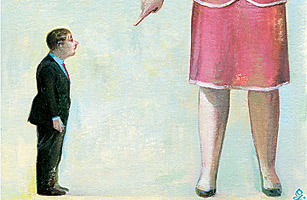Reading a recent TIME article on “Why Women Candidates are Talking Tough” inspired me to blog about the upcoming elections a little bit. While there are a record number of women candidates for national office, predictions are that women will lose ground in representational terms. If women pick up any ground (or even don’t lose it), it is predicted to be GOP women winning seats and Democratic women losing them. With so many unappealing women to vote for (whose names I’ll leave off this blog post to be polite), and so few appealing women to vote for … what’s a progressive, Democratic, pro-choice woman to do?
The easy argument (and what I’m likely to do) is to vote with your political preferences. But in the rest of this post, I’ll make an argument for voting for every woman you can, regardless of political preference.
I realize that this sort of behavior is exactly what people think feminists do (that they don’t) that gives feminists a bad name (unjustifiably), but I think it might be an important thought experiment anyway.
So the argument against voting for women just because they are women is that it doesn’t make any sense to vote against your political interests in a democracy, and doing so in effect is voting against one’s political interest. Another argument against such behavior is that feminists argue that the category “woman” is in itself false and problematic.
Conceding both of those things … what if the election (nationally and locally) is already lost to the political cause of those of us who are progressive, pro-choice democrats?
The United States falls below the world average of women’s representation at every level of government – there is a woman-majority parliament in Rwanda, and dozens of places around the world where women constitute more than 35% of the parliament or Congress. In the United States, it is less than 20 percent. Women are drastically underestimated in gubernatorial offices and the cabinet, and there has never been a woman president.
This is not incidental – it is symptomatic of systematic gender bias in the United States. It is no coincidence that women are drastically underrepresented – our ideas about what it means to be a leader correspond to masculinity (which women must constantly prove while men are assumed to have it). Still, women leaders must be “as manly as men” (so they can’t cry) while maintaining their femininity (so they can’t be too aggressive).
Waiting for these masculine (and therefore secondarily male) biased gender rules to disappear is like trying to find atlantis. So how do you get involved to end it? Maybe the answer is to vote for women. Because the more female faces we see in office (regardless of political preference, assuming, in 2010, that’s predetermined), the more we have to confront our underlying gender biases in definitions of leadership and voting habits. Maybe? Or maybe we’ll just lose a lot of women’s rights ground at the same time …
Laura Sjoberg is British Academy Global Professor of Politics and International Relations at Royal Holloway University of London and Professor of Political Science at the University of Florida. Her research addresses issues of gender and security, with foci on politically violent women, feminist war theorizing, sexuality in global politics, and political methodology. She teaches, consults, and lectures on gender in global politics, and on international security. Her work has been published in more than 50 books and journals in political science, law, gender studies, international relations, and geography.



Interesting post, Laura. A few quick thoughts:
-John Boehner cries all the time, and it hasn't diminshed his leadership cred with Conservatives
-By ignoring political preferences you may undermine gender bias through the visual frequency of female politicians, but what it means to be a female politician will be defined by those we see. Since you disapprove of the current candidates I don't think you will like the sterotype/standard that gets established.
-You assume that men are automatically viewed as masculine. I disagree. Men need to signal their masculinity quite a bit. Displays, particularly by politicians, are conducted with the idea that both supporters and opponents are looking for proof that they are masculine. Failure to signal properly undermines their masculine cred.
Yeah, Sarah Palin for President!
@mcd – I was making a specific argument for the 2010 midterm elections, where I think the political stakes are much lower, if existent, at this point.
@bill – your second argument is interesting, but I'm not sure that the stereotype problem isn't established by the candidacy. I don't think I assume that men are automatically viewed as masculine – but the standard for proving men's masculinity is lower than for proving women's. And maybe, someday, masculinity won't be a signal for leadership, right? Maybe electing more (physical) women might help that cause? I'm not sure …
@all – as I said, it was a thought experiment. in my particular balloting district, there are not any of these tough decisions, actually – there's one woman I wouldn't otherwise vote for that I am voting for, but its more a vote against her opponent than a vote for her.
Even putting political preferences aside and focusing on shifting perceptions of leadership/masculinity/femininity, this is nonsense (and you seem to suspect it in the last ellipsis. (I'll name them if you won't) Sure, voting for someone like Sharon Angle, Christine O'Donnell or, later, Sarah Palin would shift perceptions about the electability of women, but is the inevitable regression in perceptions of femininity really worth it? Is a world where, e.g., Ani Difranco is a credible role model for girls (and boys!) but a doubtful candidate for public office not preferable to one where she'd be pilloried by a Congress full of 'Mama Grizzlies'?
@Ben, I think it is nonsense, but I think it is productive thought-experiment nonsense. And I don't think its as clear-cut as you make it sound – that is, we vote for people for much dumber reasons that make bigger idiots out of themselves/us, including party line votes that get someone else in a particular caucus/voting bloc even if they go to Washington and embarrass themselves/us. I was specifically thinking about elections in which the politics don't matter because they are predetermined (e.g., 2010 Republican-majority house), not situations (like a 2012 presidential election) in which there might be real political consequences of such poor behavior. But right now, when there's not … well, the “why not?” fades, and it becomes an interesting thing to consider.